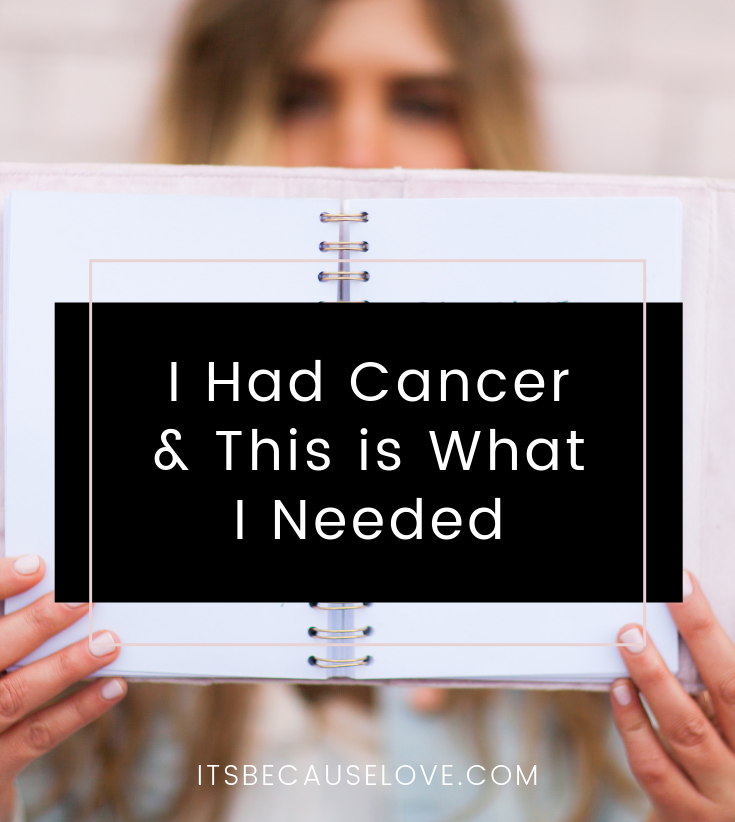
I Had Cancer & This is What I Needed
Share
Guest post by Dana Stewart of Dragonfly Angel Society
I’ve had the unfortunate joy of being a cancer patient moved to cancer survivor and then had to watch as one of my closest friends was diagnosed with breast cancer within two years of me finishing treatment. Up until my diagnosis of breast cancer when I was 32 years old, I had not had much experience with cancer. My grandma died of lung cancer when I was 6 years old but that was about it. I also lived in a nice naïve world in which I was 100% sure I would never get cancer and never see anyone I love fight the battle either. It was a nice little place, this world I lived with my eyes blanketed over by pure ignorance.
It’s been about 9 years since my diagnosis and a substantial amount has changed. I am no longer naïve on cancer. I’ve seen it first-hand now. It’s a scary, painful, fearful place that I wish no one would have to experience. What made the journey easier for me was all the support I received from friends and family. That was a game changer because although I knew no one my age that had experienced cancer, I felt so supported and not alone. Fast forward two years later and I found myself in the opposite position. A childhood friend of mine was diagnosed with breast cancer before the age of 30 and once again I found myself dealing with young adult breast cancer, but this time, from the other side.
Being a caregiver/friend of someone going through cancer puts a completely different perspective on cancer, at least it did for me. I knew what I needed as a cancer survivor, but now I was seeing the cancer survivor through the eyes of the caregiver. So, what to do? In all transparency, here, I wanted to run. I didn’t want to see someone I love face what I had just finished. It was terrifying to have to see someone else face cancer and I had no clue what to do. Instead, I took a step back and thought of all the things people did to support me as well as the things I wish I would have known or had people done when I was fighting cancer. Here are a few tips I’ve learned if you find yourself in the position of supporting a friend or family member facing cancer:
- Do not say “it’s all going to be okay.” Unless you are a fortune teller, you don’t know this to be the truth, so stay away from it. It’s the first thing you will think of – I thought it too, but it’s not helpful, I am sorry to say.
- Be yourself. The reason you are in this person’s life is because they love you for you. Don’t try to suddenly be the person you think they need because they are fighting cancer. Stay true to yourself. Trust me, this makes the fight easier for them…and for you.
- Treat them to something they love. I am not saying go out and buy them the world, but if they like to read, get the newest bestseller, if they like chocolate, buy them a sweet treat, etc. If they enjoy writing or journaling, buy them something beautiful to write in like the Love Heals journal. You get the idea.
- Laugh with them. I latched onto humor like it was a lifesaver. I made fun of everything from my bald head, to my forgetful mind (thank you chemo.) Follow the person’s lead here, but if they open up the door to laughter and humor, play along. It will help them and you too.
- Don’t run. It seems like a safe place to just run from them because you don’t know what to say or do. I don’t suggest this. It tells them you don’t care. Just because you don’t feel like you have the absolute perfect words to share about cancer, so what? Be a part of their life like the friend or family member you have always been to them. Trust me, they will want things as normal as possible.
- Stay away from “motivational” cancer stories and verbiage. This is hard to explain, but as I was going through treatment, I didn’t want to hear about “new normal” and I am just going to “have to deal with the changes in my life.” I hated all that. I hated hearing “you can’t get your old life back.” I am super well aware. However, at the time, it felt good just to get those words out. Don’t try to sugar coat the situation.
- Let the person grieve. This ties into point 6. Don’t be “Suzy Sunshine” every time you hear them talk about being scared, sad, fearful, etc. Let them speak it!! They are going through potentially one of the worst moments in their life and they are scared out of their minds. Telling them not to think the horrible thoughts that they are fearful of dying is not helpful. You may not want to hear it and they surely don’t want to say it, but it’s there and it’s in their mind. Let them speak it.
- Ask questions. Feel out what the person is willing or not willing to share. I appreciated it when people wanted to know what was happening, how I felt, how the treatment was going, etc. I had no problem chatting about it. See where this goes. Some people will be open to share and some won’t. Both are just fine.
- Do not share stories of unhappy endings. I feel this is obvious, but you would be surprised. I always got one or two of the “my friend had cancer too, but….she died.” Not helpful. Nothing else necessary to say here.
- Talk about the happenings in your life too. I literally hated when people refused to tell me about their day to day lives. They would say “oh you have so much worse things happening than hearing about how my car broke down.” No no!! I LOVED to hear about everyone’s daily lives. It made me feel normal and sane. Trust me on this one.
You know your friend or family member best. Feel out the situation. If you are open to observe the situation and read what the person you are supporting needs, you will do just fine. Most important, don’t change who you are for them as they go through cancer. They need you to be you! That’s the absolute most important thing you can do as a caregiver in the cancer realm.
Guest post by Dana Stewart of Dragonfly Angel Society
LOOKING TO SUPPORT SOMEONE BATTLING CANCER? SHOP OUR BEST CANCER GIFTS.



23 comments
Love this! I found a lump May 17th and was officially diagnosed on May 29th. I’m just starting my journey and find your words incredibly comforting and encouraging.
This list really resonated with me. I was diagnosed Stage II in 2016 and stage IV in early 2020. I will go as far as to say, I didn’t want to hear anyone else’s cancer story (good or bad) unless it was their own. I didn’t want to hear about their uncle that beat prostate cancer (really? What has that got to do with me?) or about your Aunt Susie who has been breast cancer free for 15 years now. Her breast cancer story likely has little in common with my own. I tell myself that the naive think all breast cancer is the same. They know little, if anything about staging and nothing about sub-types. They don’t know the difference between breast recurrence and metastatic. I know they are trying to be comforting and give me hope but that’s not what I need right now. Just be there to listen, to laugh and to be my friend.
This was so helpful! My sister is battling breast CA right now. I am a medical social worker and I did not know how to be there for her. This helped tremendously. I was uncertain of a few things so thank you!
Our 44 yr old bachelor son was just diagnosed with cancer . It’s very hard seeing him go thru this we stay with him during and after chemotherapy to make sure he is eating and is able to do his ADL’s etc but we have to give him his space he knows we will be there in a heartbeat but men are harder to express their feelings.
I am currently going thru breast cancer treatment with this Covid19 going on. I miss hearing from my friends and family. Sometimes people act like quarantine means you have to stay home but it also means you have the time to call and check on them. It is lonely without lunches out to look forward to and to hear what is going on with everyone else. Please stay in touch!